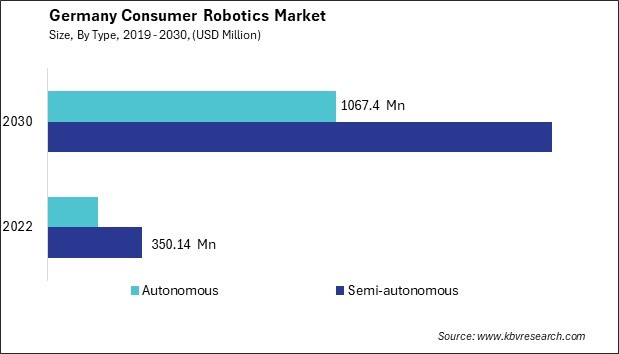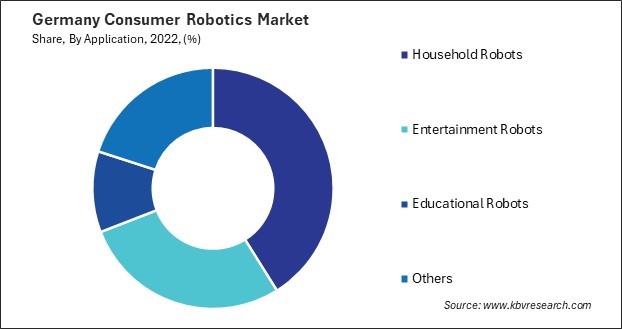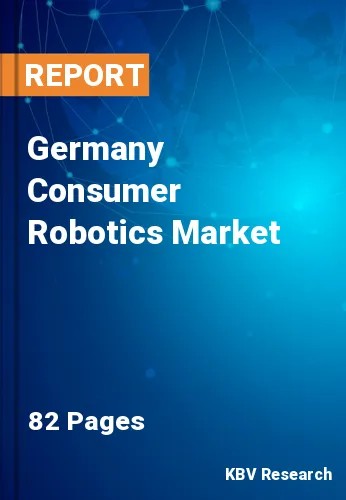The Germany Consumer Robotics Market size is expected to reach $2.9 Billion by 2030, rising at a market growth of 23.9% CAGR during the forecast period.
The consumer robotics market in Germany has experienced significant growth in recent years, driven by technological advancements, changing consumer preferences, and increasing adoption of automation solutions across various sectors. From household chores to entertainment and healthcare, robots have become integral to daily life for many Germans, offering convenience, efficiency, and innovative functionalities. Moreover, the entertainment and leisure segment represents another significant growth area within the consumer robotics market. Robots designed for entertainment purposes, such as companion robots, educational robots, and interactive toys, have captured the interest of consumers of all ages.

One of the primary drivers of the consumer robotics market in Germany is the rising need for smart home solutions. With the proliferation of connected devices and the Internet of Things (IoT), consumers increasingly seek automated systems to streamline household tasks and enhance living standards. Robotic vacuum cleaners, lawn mowers, and window cleaners are among the most popular products in this segment, offering time-saving benefits and reducing manual labor.
The COVID-19 pandemic has significantly impacted the consumer robotics market in Germany. With restrictions on social interactions and hygiene concerns, there has been an increased demand for robotic solutions that helps automate household chores and reduce the need for human intervention. Robotic vacuum cleaners and disinfection robots, in particular, have seen a surge in demand as German consumers seek ways to maintain clean and hygienic living environments. These robots offer the added benefit of reducing the risk of virus transmission by minimizing the need for human contact with potentially contaminated surfaces.
The automotive industry in Germany has been a pioneer in integrating robotics into its manufacturing processes, and this trend is now extending into the consumer robotics market. As the automotive sector continues to evolve, driven by increased efficiency, safety, and customization demands, robotics are playing an increasingly vital role in manufacturing and consumer-facing applications.
In the automotive industry, robotics have long been utilized for assembly, welding, painting, and quality control tasks. Germany, renowned for its engineering prowess, has embraced robotics to enhance productivity and maintain its competitive edge in the global automotive industry. The adoption of robotics has led to streamlined production processes, improved precision, and enhanced worker safety.
According to the International Trade and Administration, robotics, machine vision, and integrated assembly solutions have an estimated annual turnover of almost EUR 14.7 billion in 2022, which is a 10 % increase from 2019. Service robots (medical, logistics, and field robots) for professional use had a combined turnover of USD 8.5 billion in 2019. The automotive industry has increasingly embraced robotics, contributing to the growth of this sector. Additionally, the consumer robotics market in Germany has seen a surge in usage, further highlighting the expanding role of robotics in various industries and everyday life.
Moreover, as the automotive industry transitions towards electric and autonomous vehicles, the complexity of manufacturing processes is increasing. Robotics offer solutions to these challenges by enabling the automation of intricate tasks involved in producing electric vehicles, such as battery assembly and installation of advanced driver-assistance systems (ADAS).
Beyond manufacturing, robotics are making inroads into the consumer robotics market in Germany. With advancements in artificial intelligence (AI) and sensor technologies, consumer robotics are becoming more sophisticated, affordable, and user-friendly. In the automotive sector, this translates into innovations such as autonomous vacuum cleaners for vehicle interiors, robotic car wash systems, and even companion robots designed to assist drivers and passengers. Hence, the integration of robotics into both manufacturing processes and consumer applications drives innovation and efficiency in the German automotive industry, signaling a transformative shift towards automation and enhanced user experiences.
In recent years, Germany has witnessed a remarkable surge in the popularity of entertainment robots within the consumer robotics market. One key driver of the rising popularity of entertainment robots is the rapid pace of technological innovation. Manufacturers have been able to develop robots with increasingly sophisticated capabilities, such as artificial intelligence (AI), natural language processing, and computer vision. Moreover, the proliferation of affordable consumer robotics platforms has made it easier for individuals and families to access entertainment robots.
Another factor contributing to the growing demand for entertainment robots is German consumers' changing demographics and lifestyles. With an aging population and an increasing number of single-person households, there is a growing need for companionship and entertainment. Entertainment robots offer a unique solution to address these needs, providing companionship, entertainment, and even assistance with everyday tasks in Germany.
Furthermore, the growing trend of social robots, specifically designed to interact with humans in social settings, has contributed to the popularity of entertainment robots in Germany. These robots are equipped with advanced speech recognition and natural language processing capabilities, allowing them to engage in meaningful conversations and provide companionship to users. Therefore, the surge in entertainment robot popularity in Germany is driven by technological advancements meeting changing societal needs, particularly in companionship and assistance, accentuated by an aging population and evolving household structures.

The consumer robotics market in Germany has experienced significant growth in recent years, driven by technological advancements, changing consumer preferences, and an increasing focus on automation and efficiency. One notable player in the German consumer robotics market is KUKA AG, a leading manufacturer of industrial robots and automation solutions. While traditionally focused on industrial applications, KUKA has also ventured into the consumer robotics market with products such as the KUKA Home, a robotic arm designed to assist with household tasks such as cooking, cleaning, and gardening. With its reputation for precision engineering and reliability, KUKA has quickly gained traction among German consumers seeking to integrate robotics into their daily lives.
Another prominent German company in the consumer robotics space is Bosch, a multinational engineering and technology company known for its automotive components, power tools, and home appliances. Its robotic vacuum cleaners, lawn mowers, and companion robots lineup reflects its commitment to delivering cutting-edge technology to German consumers seeking convenience and efficiency in their homes.
Additionally, German startup companies have emerged as key players in the consumer robotics market, leveraging the country's strong entrepreneurial ecosystem and technical expertise. One example is Robart GmbH, a Berlin-based startup specializing in autonomous navigation systems for robotic vacuum cleaners and floor scrubbers. Robart's proprietary technology enables robots to map and navigate indoor environments with high precision, enhancing their efficiency and user experience. With the growing demand for automated cleaning solutions in German households, Robart has positioned itself as a leading provider of intelligent navigation systems for consumer robots.
German companies are leveraging robotics in the healthcare sector to enhance patient care and improve medical outcomes. For example, German medical device manufacturer Siemens Healthineers offers robotic-assisted systems for minimally invasive surgery, enabling surgeons to perform complex procedures with greater precision and control. With a strong emphasis on quality, reliability, and technological advancement, German companies are well-positioned to capitalize on the growing demand for robotic solutions among consumers seeking to simplify their lives and improve efficiency in an increasingly automated world.
By Type
By Application
Our team of dedicated experts can provide you with attractive expansion opportunities for your business.

